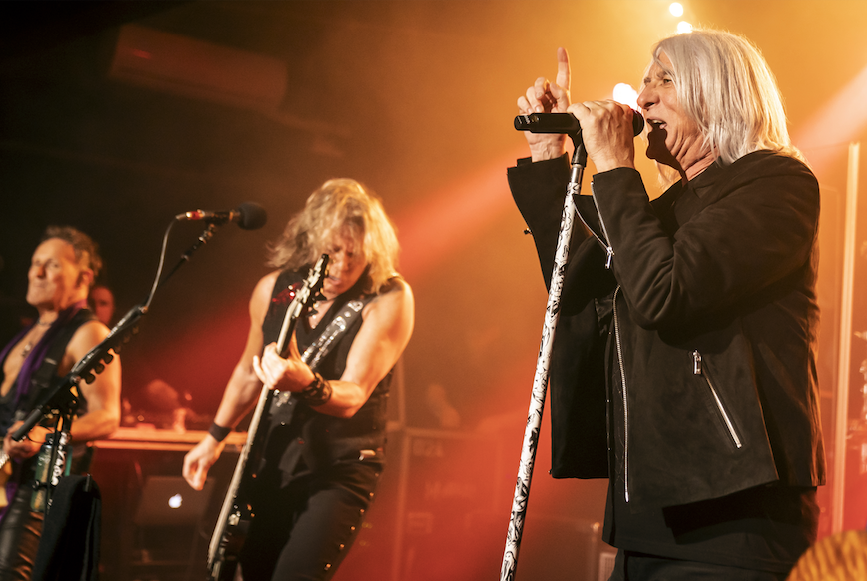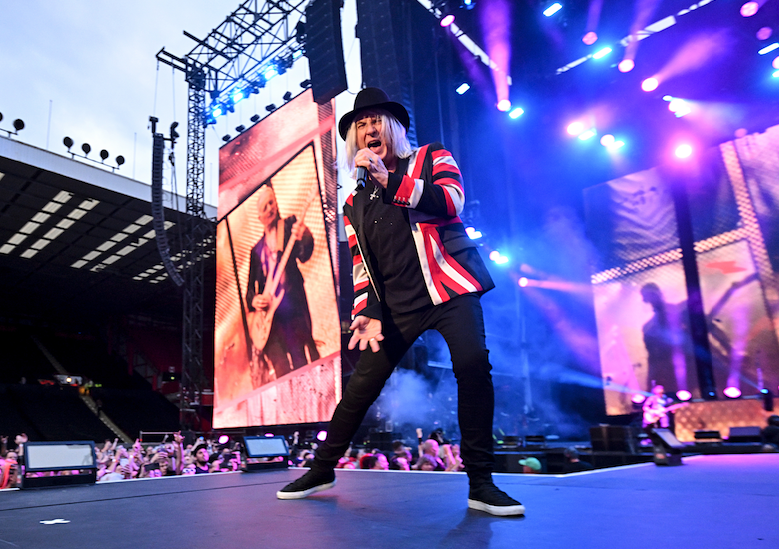In rock’n’roll, there’s always drama with the lead singer. “I’m never, ever singing a song with the word ‘rocking’ in it again,” Joe Elliott declared to his Def Leppard bandmates sometime during the pandemic. “‘Rock of Ages.’ Rock of anything. ‘Let’s Get Rocked,’ ‘Rocket,’ ‘Rock On,’ — I’m not doing it.”
“Really,” replied Phil Collen, their eternally bare-chested guitar hero. “Because I’ve just written a song called ‘You Rock Me.’”
“‘For God’s sake. OK, let’s at least change the spelling a bit,’” Elliott recalls to SPIN over the phone, laughing because even in their sixties, Def Leppard still has moments that sound plucked from a Spinal Tap script. In 1988, Elliott told SPIN, “We could have ridiculed heavy metal a lot better than they did.”
Sure enough, no album in 2023 captures the “goes to 11” energy as thrillingly as Def Leppard’s recent collaboration with the Royal Philharmonic Orchestra of London. Recorded at Abbey Road Studios in March, Drastic Symphonies revitalizes their already over-the-top power ballads. “Bringin’ on the Heartbreak,” “When Love & Hate Collide,” “Have You Ever Needed Someone So Bad,” “Love Bites” — even freaking “Animal” — get the rock-opera treatment. Newer tracks, like Diamond Star Halos’ “Goodbye For Good This Time” and “Angels (Can’t Help You Now)” reach the hyperbolic and — forgive me — hysterical bar the world demands of these heavy-metal headbangers. Only “Hysteria” is rendered more or less the same. Can’t improve upon perfection.
Lots of other bands have recalibrated their work with world-class orchestras: Metallica, Deep Purple, Elton John, Frank Zappa. Drastic Symphonies, conversely, accentuates Leppard’s sound. The album highlights the musicianship Elliott, Collen, Rick Savage, Rick Allen, and Vivian Campbell have always proffered — yet rarely get serious recognition for — despite being one of the best-selling hard-rock bands of all time, a favorite of both Taylor Hawkins and Taylor Swift’s mother; and still capable of shifting hundreds of millions of tickets. Such is the plight of crossover success.
In 2019, the Rock and Roll Hall of Fame inducted Def Leppard. But only, Elliott sourly points out, because of the fan vote introduced in 2013. When the public could decide, they were in. When it was up to the rock cognoscenti? Not a chance.
“We don’t care about credibility. Never have, never will,” the lead singer says from his home in Stepaside, Ireland, a charming village south of Dublin where he lives with his wife of 20 years, Kristine Wunschel, and their kids Finlay (14), Lyla (7), and Harper (3). “Though, it would be nice.”
The following interview has been edited and condensed for clarity.
SPIN: What’s kept you in Dublin for 38 years?
Joe Elliott: Dublin to me was a bit like “Sheffield by the Sea.” I’ve always loved the ocean because we never had it growing up. Lo and behold, I did one of those Ancestry.com things. As much as I’m 25% English, I’m 26% Irish. The music and the poetry scene is off the charts for the size of this place. When I first went to Ireland in the ‘80s, we were backstage at a Simple Minds gig. I remember this gentleman came up. He says, “Oh, I heard you were in town. Here is my number if you need anything.” It was Bono. I’m thinking to myself, this shit never happened when I was in Sheffield [Laughs].
In 1987, U2 was touring The Joshua Tree and Def Leppard was touring Hysteria. Two monster albums. Two massive world tours. Both hit No. 1. When it was all over, did that success change your relationship with the U2 guys in any way?
Obviously, I’ve known [the U2] guys since 1986. I often went to dinner with them. Paul McGuinness, U2’s then-manager, used to have New Year’s Day parties in his house. We weren’t hanging out, but I’d see them often. Around 1990, we’d just come off the back of our biggest-ever tour, and we were thinking, where do we go from here?, the same way that U2 was. They were working on Achtung Baby, and we were working on what would turn into Adrenaline.
I read that Bono introduced you to your hero, David Bowie, sometime around then. How did that go down?
It was at Bono’s house in August of 1990. The night before, he was at Bowie’s Sound+Vision show at the Point Depot in Dublin. So I get there and Bono goes, “Come inside. I want to introduce you to somebody.” I walk into this room and was like, “Fucking hell, man. You could have given me a fucking warning.” I’ve been watching this guy since 1972. 18 years. Every record he’s ever made. What the hell am I supposed to say? “How’s the weather?”
What happened next?
Eventually, we went off to hang with everybody else at the barbecue. It became obvious to all of us that the Edge wasn’t there. Bono said it’s his birthday and he’s off to dinner with his wife. This is where a very mischievous look appeared in David Bowie’s eyes. He went, “Let’s go and surprise him and sing him ‘Happy Birthday.’” So myself, David Bowie, Bono, and Bono’s assistant disappeared in his [car]. It’s like The Italian Job. I’m sat in the back and Bowie’s in the front. We drive to this restaurant, which is about 20 minutes from Bono’s house. David’s assistant is going apoplectic at the house, thinking that me and Bono kidnapped David Bowie. It was mental. And he was just having a good time. When you’re a kid from Sheffield that was introduced to David Bowie with “Starman” on the Top of The Pops, and he’s whisking you off to a restaurant to sing “Happy Birthday” to the Edge? I still pinch myself.
You were 12 when you saw your first concert — T. Rex. Those early glam rock bands seem to loom just as large for you now. Diamond Star Halos namechecks the “Bang A Gong” lyric.
I kind of live my life as a fan, still with the bands that got me into music in the first place, with the odd exception of some cream that rises to the top every 10 years. In the ’90s, it was the Foo Fighters. In the ‘00s it was Muse. The only way that you can reinvent music to sound completely new is if it’s a completely new form of music, like rap was when it came out. When I listened to that, [I thought] “It’s not for me.” It’s not my thing.
But weren’t you kind of rapping in the ‘80s?
[Laughs] The picture of me potentially capable of rapping is astonishing.
I know that sounds ridiculous. But that strutting, syncopated vocal style really showed up in your music after hip-hop went mainstream. There was no connection there?
When we did “Pour Some Sugar on Me,” there’s no doubt it was influenced by Aerosmith and Run DMC’s “Walk This Way” remake. Steven Tyler rapping the way that Debbie Harry rapped in “Rapture” isn’t really rapping, it’s rapid speaking. It was all about the attitude. That was like punk, you know, the Sex Pistols. With the greatest respect to John Lydon, who I love to death, and Joe Strummer, they weren’t exactly Lou Gramm or Paul Rodgers when it came to singing. But that was the whole point. They didn’t want to be. Punk was an alternative that I could get my head around. “Pretty Vacant, “God Save the Queen,” “White Riot,” and even “Rock the Casbah,” were great songs, just played by musicians who weren’t exactly on the path to join Yes.
So glam inspired you to join a band, but punk gave you permission to sing as you wanted.
My thing in the early days was just me trying to sing, period. I mean, I couldn’t sing at all. I just got the job because I was tall and enthusiastic. I was a big fan of the people who weren’t great singers. That gave me the confidence to be a singer. Little Richard was a great singer, but he didn’t sing — he screamed. John Fogerty, one of few Americans to have made inroads outside of America, had such a voice. Elvis was a great singer, but he never got out of his comfort zone of mid-range. He never went for it. I can’t imagine [Elvis] singing “Whole Lotta Rosie.” Then you get people like Axl [Rose] who came along in the ’80s. He was singing for what you might call a traditional rock band, with a little bit of Michael Monroe and David Johansen, another favorite of mine. And without Mick Jagger, there would be no David Johansen.
You are clearly a student of music history.
I’m more of a wannabe historian. When you become the doer rather than the watcher, it starts to fall away.
It’s no secret you were never darlings of the press.
We’ve never been and we never will be. But that was never my intention. I never watched the telly as a kid thinking, “Can’t wait to get into those psychological battles with the media!” I just wanted to get onstage.
Does hair metal deserve a critical reappraisal?
I think sooner or later, there has to be — even if it’s reluctant — an acknowledgment. Like, “Dude, fair play.” Leppard and Crüe with Poison and Joan Jett are putting 30,000, 40,000 people in stadiums. There has to be an acceptance of the truth. I get that fancy magazines are always pushing for the underdog. We were once the underdogs, to a point, but we never wanted to be the underdog. We never wanted to stay down there.
You used to get quite defensive when journalists lumped Def Leppard in with Mötley Crüe and Poison.
I do, occasionally, get accused of being a bit overly defensive. It’s not been overly defensive. It’s just being realistic and going, “Look, this is the way it is.” I disagree wholeheartedly with the way the media said we weren’t valid artists; that we wouldn’t have sold any records without MTV. You could say the same thing about Michael Jackson. Are you telling me that he’s not a valid artist? Or Kate Bush or Peter Gabriel? Of course, they are valid artists, even though their videos were played for thousands and thousands of hours on MTV.
How have older rock bands, like Queen and the Stones, affected your decision-making as far as longevity?
The Rolling Stones during the ’80s was a struggle for the band, and in the same way, the ’90s were a struggle for us. Even if the record gets destroyed, it’s like, “They’re still around, they filled the stadiums, as they’ve been since the late ’80s, ’90s.” We can move into that tacitly, as long as we stick together and keep going.
You’ve likened Diamond Star Halos to Fleetwood Mac’s classic album, Rumours. Why?
If you write the lyrics to “Armageddon It” or “Sugar” on paper, it’s not exactly T. S. Elliot. But it’s not supposed to be. It’s nonsensical, but it’s got a phonetic power to it that overrides any nonsense worry about whether it’s great poetry or not. This time, I wanted to be a bit more mature in the writing, and not be worried about what some heavy metal freak from wherever might think. When I wrote “Goodbye for Good This Time,” I thought, “That’s a really clever hook. You get to use the word good twice in a great context.” This is singer/songwriter stuff. This is Neil Sedaka. This is Carole King. This is Burt Bacharach.
What did the rest of the band think?
When Phil [Collen] first heard “Angels,” he said, “Sounds like Elton John from Madman Across the Water.” I’m like, “Okay, that’s the best compliment anybody ever paid me.”
How do you write a sad song without sending yourself into a spiral?
It’s the case of learning how to write a song that pulls onto other people’s heartstrings without damaging yourself. If I could channel anybody, it would be Bernie Taupin. As a lyric writer, he is totally underrated and barely ever discussed, because Elton John blocked out his sun. Bernie’s contribution, as we know, is immense. But he’s probably happy to be able to walk down Sunset Boulevard, and nobody knows who the hell he is.

Def Leppard keeps churning out new material. What’s the most challenging part of songwriting these days?
The challenges for me are, “Do I believe we’ve written our most popular song ever?” Maybe. Some of the [new] stuff like “Goodnight, Mr. Jones” or “Last Man Standing,” for me, are some of the greatest things I’ve ever done. There were a couple of minutes where I thought, “I wonder if I’ll ever write anything better than this?” I hope so.
How do you work through creative blocks?
I used to freak out. As soon as I got frustrated — if I was only missing a line — I would write anything to fill it in and come back the next day going, “Well, that was a pile of shit.” And it was, because I forced myself to finish it because we needed to finish it. Now, I walk away, and whether it’s the next day or three weeks later, I’ll have a eureka moment. “Got it.”
Is there anything you swear by to take care of your voice on the road?
I drink lots of hot tea, but I’m not a monk. There’s lots of wine. Sometimes before we go on, a shot of whiskey or something silly just to get your brain fired up. But, you know, don’t go to nightclubs till six in the morning, screaming for your next drinks order, and expect to sing like Aretha Franklin the next day.
What’s the biggest myth about Def Leppard you’d like to set straight?
We work hard at it. We prepare for a tour like a sports team. We work out. I exercise my voice. I’m in the gym every other day. That whole myth of a band where everybody’s drunk all day and then they perform perfectly? Bullshit.
Lead singers get the brunt of ageism. Everyone compares how their voice sounds today to how it sounded in their 20s. Does that faze you?
There’s no reason why you shouldn’t be better at your job now than you were when you were 22. I’m a way better singer now. If I’m going to sing like shit, it’s because I’ve got a cold, or I’m ill. I will be ill, but I will never be ill-prepared.





